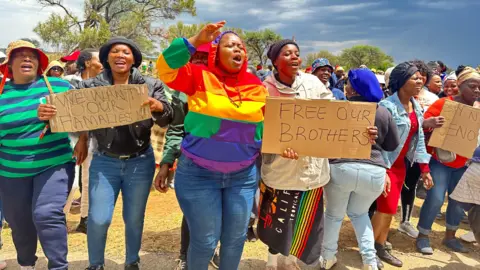 BBC
BBCDozens of volunteers have entered an abandoned gold mine in South Africa to help what could be thousands of illegal miners who have been underground for a month.
Because the miners entered the shaft in Stilfontein deliberately, desperate to retrieve gold or mineral residues, the authorities have taken a hard line, blocking food and water supplies.
Earlier in the week, one government minister said: “We are going to smoke them out.”
The miners have refused to co-operate with the authorities as some are undocumented migrants and fear being deported or arrested.
There are reports that the miners have been eating vinegar and toothpaste to survive while underground.
It is feared that their health could be deteriorating, and they may be too weak and frail to leave the mine themselves.
The volunteers, who are organised into three groups of 50, say it takes about an hour to get one person out.
Lebogang Maiyane has been volunteering since the beginning of the week.
“The government doesn’t care about the impact on the right to life of the illegal miners who remain beneath the surface – this is tantamount to murder” he said.
Illegal miners are called “zama zama” (“take a chance” in Zulu) and operate in abandoned mines in the mineral-rich country. Illegal mining costs the South African government hundreds of millions of dollars in lost sales each year.
Police are hesitant to go into the mine as some of those underground may be armed.
Some are part of criminal syndicates or “recruited” to be in one, Busi Thabane, from Benchmarks Foundation, a charity which monitors corporations in South Africa, told the BBC’s Newsday programme.
Many South African mines have closed down in recent years and workers have been sacked.
To survive, the miners and undocumented migrants go beneath the surface to escape poverty and dig up gold to sell it on the black market.
Some spend months underground – there is even a small economy of people selling food, cigarettes and cooked meals to the miners.
Local residents have pleaded with the authorities to assist the miners, but they have refused.
“We are going to smoke them out. They will come out. We are not sending help to criminals. Criminals are not to be helped – they are to be persecuted [sic],” said Minister in the Presidency Khumbudzo Ntshavheni on Wednesday.
A father, whose two sons are underground, said the minister’s remarks were “horrible”.
“These people are human beings. These people have families,” he told the BBC.
Relatives of the miners have been protesting near the mine site, holding placards with the words: “Smoke ANC out” and “Down with Minister in Presidency”.
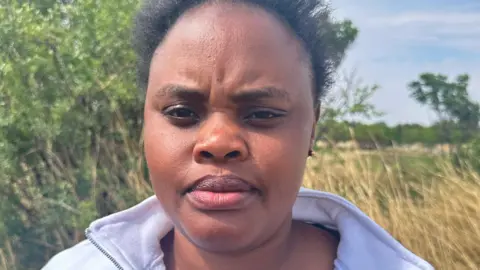
Police Minister Senzo Mchunu visited the site on Friday, but as he tried to speak to community members waiting to hear news of their loved ones in the shaft, he was chased away.
Thandeka Tom, whose brother is in the mine, criticised the police for not sending help.
“They’re speaking from a point of privilege, there’s a problem of unemployment in the country and people are breaking the law as they try to put food on the table” she told the BBC.
Without any access to supplies, conditions underground are said to be dire.
“It is no longer about illegal miners – this is a humanitarian crisis,” said Ms Thabane.
On Thursday, community leader Thembile Botman told the BBC that volunteers had used ropes and seat belts to pull a body out of the mine.
“The stench of decomposing bodies has left the volunteers traumatised,” he said.
It’s not clear how the person died.
Although the authorities have been blocking food and water, they have temporarily allowed local residents to send some supplies down by rope.
Mr Botman said they had been communicating with the miners by notes written on pieces of paper.
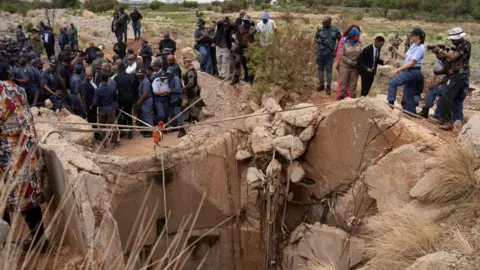 Reuters
ReutersPolice have blocked off entrances and exits in an effort to compel the miners to come out.
This is part of the Vala Umgodi, or “Close the Hole”, operation to curb illegal mining.
Five miners were pulled out on Wednesday by rope, but they were frail and weak. Paramedics attended to them, and then they were taken into police custody.
In the last week, 1,000 miners have emerged and been arrested.
Police and the army are still at the scene waiting to detain those who are not in need of medical care after resurfacing.
“It’s not as easy as the police make it seem – some of them are fearing for their lives,” said Ms Thabane.
Many miners spend months underground in unsafe conditions to provide for their families.
“For many of them it’s the only way they know how to put food on the table,” said Ms Thabane.
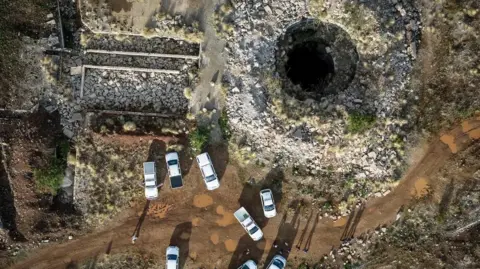 AP
APThe South African Human Rights Commission says it will investigate the police for depriving the miners of food and water.
It said there is concern that the government’s operation could have an impact on the right to life.
Illegal mining is a lucrative business across many of South Africa’s mining towns.
Since December last year, nearly 400 high-calibre firearms, thousands of bullets, uncut diamonds and money have been confiscated from illegal miners.
This is part of an intensive police and military operation to stop the practice that has severe environmental implications.
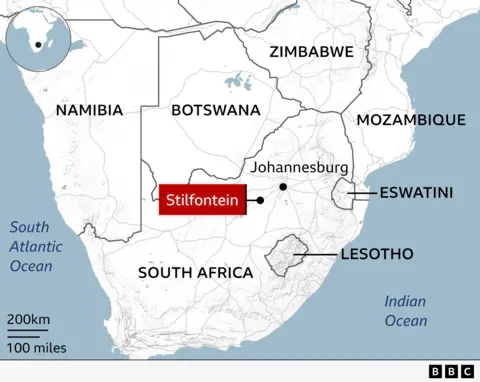
More BBC stories from South Africa:
 Getty Images/BBC
Getty Images/BBC
